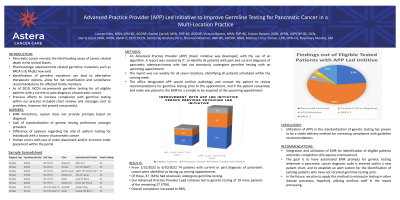Back

Clinical Posters
JL1002C: Advanced Practice Provider–Led Initiative to Improve Germline Testing for Pancreatic Cancer in a Multilocation Practice
Saturday, October 22, 2022
10:00 AM – 11:00 AM ET


Lauren Kiley, MSN, APN-BC, AOCNP (she/her/hers)
Advanced Practice Nurse, Director of Patient Navigation Services
Astera Cancer Care
Jackson, New Jersey, United States
Poster Presenter(s)
INTRODUCTION
Pancreatic cancer remains the third leading cause of cancer-related death in the United States. Many recent pharmacologic advancements have stemmed from an increasing understanding of hereditary syndromes, caused by germline mutations in genes such as BRCA 1/2 & PALB2. Identification of these germline mutations can lead to alternative upfront or later-line targeted therapeutic options and allow for risk stratification and surveillance recommendations for affected family members. In March 2019, the NCCN Clinical Practice Guidelines for Oncology recommended that germline testing be considered for all patients with pancreatic adenocarcinoma. Our goal was to develop an efficient means of standardizing germline testing for all eligible patients, with either a current or past diagnosis of pancreatic cancer. Previous methods to increase compliance within our offices, including chart reviews and individual messages to the treating physician, have not been successful.
METHOD
An Advanced Practice Provider (APP)-driven initiative was developed, with the use of an algorithm. A report was created by IT, identifying all patients with a current or past diagnosis of pancreatic adenocarcinoma, that had not had previous genetic testing. This report was run weekly for each of our seven office locations, providing a list of patients scheduled for an appointment in the upcoming week. The office designated APP would confirm pathology and then contact the patient to discuss the recommendation for germline testing prior to their appointment. If the patient consented to proceed, an order would be placed in the electronic medical record (EMR) for a sample to be acquired at the upcoming appointment. Our molecular team, consisting of an LPN and MA, would then complete a form in the online portal for the testing company, track result status and upload to the EMR when complete. Each patient was then provided with a review of findings, and referral for genetic counseling if indicated.
RESULTS
From 1/31/22 – 6/10/22, 74 individual patients with pancreatic cancer were identified as having upcoming appointments. Of these, 47(63%) had previously undergone testing. Our initiative led to genetic testing of 19 of the remaining 27 (70%). This increased overall compliance to 89%.
CONCLUSION
Utilization of APPs in the standardization of genetic testing has proven to be a viable delivery method for increasing compliance. Over a four-month period, we increased our overall compliance rate by 26%, leading to an overall rate of 89%.
RECOMMENDATIONS
Integration and utilization of the EMR for identification of eligible patients and order completion still requires improvement. Our APP-led initiative is still a very manual process, with the need to follow spreadsheets and consistently run weekly reports. Ideally, the EMR would provide automated prompts based on diagnosis.
Other barriers encountered include the lack of standardization of genetic testing preference options amongst providers, difference of opinions regarding the role of uniform testing, as well as human errors with incorrect or lack of order placement.
We plan to apply this method to molecular testing in other disease process, hopefully utilizing more ancillary staff in the report process.
Pancreatic cancer remains the third leading cause of cancer-related death in the United States. Many recent pharmacologic advancements have stemmed from an increasing understanding of hereditary syndromes, caused by germline mutations in genes such as BRCA 1/2 & PALB2. Identification of these germline mutations can lead to alternative upfront or later-line targeted therapeutic options and allow for risk stratification and surveillance recommendations for affected family members. In March 2019, the NCCN Clinical Practice Guidelines for Oncology recommended that germline testing be considered for all patients with pancreatic adenocarcinoma. Our goal was to develop an efficient means of standardizing germline testing for all eligible patients, with either a current or past diagnosis of pancreatic cancer. Previous methods to increase compliance within our offices, including chart reviews and individual messages to the treating physician, have not been successful.
METHOD
An Advanced Practice Provider (APP)-driven initiative was developed, with the use of an algorithm. A report was created by IT, identifying all patients with a current or past diagnosis of pancreatic adenocarcinoma, that had not had previous genetic testing. This report was run weekly for each of our seven office locations, providing a list of patients scheduled for an appointment in the upcoming week. The office designated APP would confirm pathology and then contact the patient to discuss the recommendation for germline testing prior to their appointment. If the patient consented to proceed, an order would be placed in the electronic medical record (EMR) for a sample to be acquired at the upcoming appointment. Our molecular team, consisting of an LPN and MA, would then complete a form in the online portal for the testing company, track result status and upload to the EMR when complete. Each patient was then provided with a review of findings, and referral for genetic counseling if indicated.
RESULTS
From 1/31/22 – 6/10/22, 74 individual patients with pancreatic cancer were identified as having upcoming appointments. Of these, 47(63%) had previously undergone testing. Our initiative led to genetic testing of 19 of the remaining 27 (70%). This increased overall compliance to 89%.
CONCLUSION
Utilization of APPs in the standardization of genetic testing has proven to be a viable delivery method for increasing compliance. Over a four-month period, we increased our overall compliance rate by 26%, leading to an overall rate of 89%.
RECOMMENDATIONS
Integration and utilization of the EMR for identification of eligible patients and order completion still requires improvement. Our APP-led initiative is still a very manual process, with the need to follow spreadsheets and consistently run weekly reports. Ideally, the EMR would provide automated prompts based on diagnosis.
Other barriers encountered include the lack of standardization of genetic testing preference options amongst providers, difference of opinions regarding the role of uniform testing, as well as human errors with incorrect or lack of order placement.
We plan to apply this method to molecular testing in other disease process, hopefully utilizing more ancillary staff in the report process.

